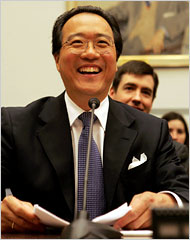
New York Times
April 5, 2006
Yo-Yo Ma Testifies on Capitol Hill About Artists' Visa Problems
By DANIEL J. WAKIN
WASHINGTON, April 4 — Scrounging for younger audiences. Squeezing donors. Seeking relevance alongside the pop culture behemoth. In some ways, times are tough in the performing arts. But a quiet new headache has arisen: just getting foreign artists into the country.
Agonizing waits and mounting costs for artist visas are plaguing arts presenters, partly because of post-9/11 security measures, but also because of changes that occurred before the attacks. On Tuesday, the performing arts world succeeded in taking its case to Congress, putting Yo-Yo Ma on a hearing room stage.
In a crisp black suit and without his cello, Mr. Ma testified before the House Committee on Government Reform, appealing to the government to ease the path of foreign musicians coming here.
"I think dignity is the huge issue that we're all talking about," he told the committee, which is looking into the delays for visas issued to performers, students and workers.
Concert and dance presenters, festivals and countless smaller organizations — often those who can least afford it — have had their budgets burdened with new immigration costs. Anecdotes abound about tours that have been canceled because the artists did not receive visas in time or did not want to pay the extra costs, or because the presenters did not want to risk a cancellation. Other artists have simply decided not to try to come.
Mr. Ma appeared in his role as leader of the Silk Road Project, an ensemble bringing together musicians from across Central Asia and the Middle East, which he founded a decade ago.
While the hearing was strongly focused on the difficulty of bringing in nonartists, like technology workers from India and graduate students from China, Mr. Ma was clearly the star of the show. But by the time his question-and-answer period came, only the committee's chairman, Representative Tom Davis, Republican of Virginia, was in attendance.
"You don't need a passport or a plane to visit someplace new," Mr. Ma testified. "Music provides a shortcut, allowing you to be transported thousands of miles away and back during the two-hour span of a concert."
Mr. Ma said barriers to foreign musicians "have become extraordinarily high." He cited the case of two Iranian musicians, Siamak Aghaei and Siamak Jahangiri, who have visited the United States eight times with the Silk Road Project since 2000 and must still wait months before receiving visas. They have to fly to Dubai for a consular interview and then fly back to pick up the visa. In the last year, Mr. Ma said, they went a third time because the visa printer was out of order. The latest procedure lasted three months and cost $5,000.
In another case, the Hallé Orchestra of Manchester, England, canceled a two-concert United States tour partly because of the cost of having to take all 100 players and staff members to the United States Embassy in London for personal interviews, said Sandra L. Gibson, the president and chief executive of the Association of Performing Arts Presenters. Ms. Gibson said the cost mounted to $80,000.
Post-9/11 rules now require almost all nonimmigrant visa applicants to undergo face-to-face interviews. The wait for an interview can often take three months in some places and sometimes up to five months in India. Costs have gone up, too. Performing arts presenters must apply here to bring in performers, another process that can drag on for weeks or months. The United States Customs and Immigration Service charges organizations a $1,000 "premium processing fee" to do it in two weeks, instead of the normal $190 fee. Many organizations just pay the larger fee. In addition, each individual applying for a visa must pay $100.
The arts presenters association represents a field of 7,000 organizations. Ms. Gibson said 75 percent of them presented foreign artists in 2002. The percentage was down to some 60 percent last year, she said, because of the red tape.
Arts presenters acknowledge that the United States immigration service is hard pressed for funds, staff and facilities, and that the number of visa requests is rising.
Tony Edson, the State Department's deputy assistant secretary for visa services, defended the government's record on visas, saying that 515 consular jobs had been created since September 2001. The State Department has improved training, computer systems and efficiency, he added. Paperless visas and digital video interviews are being considered. Personal interviews, he said, are an "incredibly useful" security tool.
Committee members acknowledged that security was important but argued that it had to be balanced with openness. "In the long run, our security is enhanced and not diminished by the exchange of people and ideas," said Representative Henry Waxman, Democrat of California.

No comments:
Post a Comment